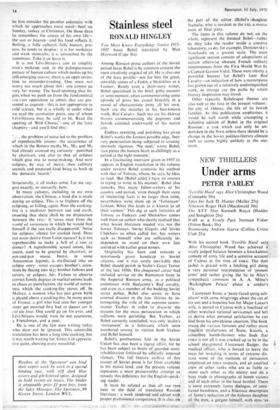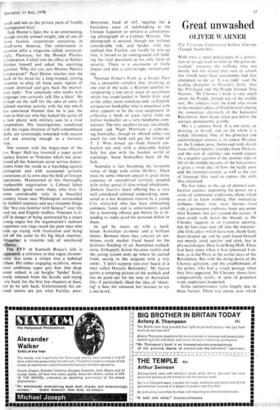NEW THRILLERS
Under arms
PETER PARLEY
!Terrible Hard' says Alice Christopher Wood (Constable 30s) Spies Inc Jack D. Hunter (Muller 25s) Nineteen Roger Hall (Macdonald 30s) The XYY Man Kenneth Royce (Hodder and Stoughton 28s) Walk at a Steady Pace Norman Fisher (Triton Books 30s) Boomerang Andrew Garve (Collins Crime Club 25s)
With his second book 'Terrible Hard' says Alice Christopher Wood has achieved a nicely judged balance between a knockabout comedy of army life and a sensitive account of Cyprus at the time of EOKA. The dust jacket is graced with a fetching girl doing a very personal interpretation of 'present arms' and rather giving the lie to Alice's sympathetic comment in A. A. Milne's 'Buckingham Palace' about a soldier's life.
Lieutenant Stone, a 'pasty-faced sprog sub- altern' with some misgivings about the cut of his suit and a hopeless lust for Major Lucas's wife, is posted to Cyprus with a boatload of other wretched national servicemen and left to derive what personal satisfaction he can find from his unwelcome situation. The book traces the various fortunes and rather more fremient misfortunes of Stone, Kouris, a schoolboy bomb-thrower who finds that EOKA is not all it was cracked up to be in the school playground, Lieutenant Badger, the medical officer, who is forced to leave the mess for revealing in terms of extreme dis- taste some of the methods of persuasion employed on EOKA suspects, and an assorted crew of other ranks who are as liable to shoot each other as the enemy and do a busy trade in photographs of bomb victims and of each other in the local brothel. There is some extremely funny dialogue, of unre- lieved bawdiness, and a hilarious description of Stone's seduction of the hideous daughter of the RSM, a gorgon himself, with eyes 'as small and. wet as the private parts of freshly impregnated mice'.
Jack Hunter's Spies Inc is an entertaining, though strictly airmail weight, tale of one of those faceless corporation executives in small-town America. The unfortunate in question edits a magazine called, excruciat- ingly, Plastimes, for the Hooten Plastics Corporation. Called into the office of Balsley Hooten himself and asked the searching question 'Why did you join Hooten Plastics Corporation?' Paul Dexter reaches into the back of his mind for a long-winded, stirring response to allay all those panic signals of instant dismissal and gets back the marvel- lous reply: 'For somebody who works with language you certainly talk like a klotz'. He is kept on the staff for the sake of some ill defined wartime activity with the oss which has convinced Hooten that he is just the man to find out who has leaked the secret of a new plastic with military uses to a rival corporation. His investigations, conducted with the vague intuition of half-rzmembered skills, are surprisingly rewarded with success and are amusing enough in a tortuous way.
Not content with the bogey-man of the CIA, Roger Hall has 'invented a super secret agency known as Nineteen which has pene- trated all the American secret service depart- ments from the inside as a watchdog against corruption and with occasional quixotic excursions of its own into the field of foreign operations. Mastermind of this thoroughly implausible organisation is Colonel Jabez Sparhawk (good name that), who lives in some considerable style in a beautiful country house near Washington surrounded by faithful retainers and says tiresome things like 'Are you familiar with Seneca?' over the iced tea and English muffins. Nineteen is it- self in danger of being penetrated by a smart young.negro but the organisation's stalwart supermen run rings round the poor man who ends up crying with frustration and being led off the scene by his big black mammy. Altogether a tiresome tale ,of unrelieved silliness.
The XYY of Kenneth Royce's title is apparently a reference to that rogue chromo- some that turns a citizen into a habitual villain. His rather engaging recidivist, whose most ambitious caper gets him into deep water indeed, is cat burglar 'Spider' Scott, newly released from the Scrubs and trying 'ery hard, for the first few chapters at least, not to be sent back. Unfortunately his un- usual talents are just what Fairfax, pseu-
donymcnis head of D15, requires for a hazardous piece of safebreaking at the Chinese Legation to retrieve a compromis- ing photograph of a Cabinet Minister. The photograph is secured, though not without considerable risk, and Spider, who has realised that Fairfax can hardly let him go free, is forced to go underground still hold- ing the vital document as his only form of security. There is a succession of lively chases and also a convincingly twisted end- ing.
Norman Fisher's Walk at a Steady Pace has a pleasantly complex plot, involving, at one end of the scale. a Russian satellite in- corporating a top secret piece of equipment which has crash-landed in North Italy and, at the other, more mundane end, an English antiquarian bookseller who is presented with what appears to be the easy assignment of collecting a book of great rarity from an Italian bookseller on a very handsome com- mission. The two, needless to say, are closely related and Nigel Morrison—a convinc- ing bookseller, though he offered rather too much for one book and got the initials of T. J. Wise mixed up—finds himself em- broiled not only with a delectable Italian lady but also with the hotshot world of espionage. Some booksellers have all the luck.
Australia is fast becoming the favourite venue of large scale crime thrillers. There must be some inherent appeal in great dusty expanses of unexploited territory peopled with rather genial if slow-witted inhabitants. Andrew Garve's latest offering has a very well considered criminal undertaking, spon- sored as a last desperate venture by a young City whizz-kid who has been embezzling company funds and is unfortunately jailed for a motoring offence just before he is in- tending to make good his personal deficit in them.
In jail he meets up with a hard- bitten Australian ex-miner and a brilliant mimic. Between them they concoct an am- bitious stock market fraud based on the fictitious flooding of an Australian outback mine. Unhappily fiction becomes reality and the young tycoon ends up where he started from, saying to the sergeant with a wry smile: 'I don't suppose you ever heard of A man called Horatio Bottomley'. Mr Garve paints a tempting picture of the outback and has an acute ear for the tone of Australian life—I particularly liked the idea of 'shout- ing' a beer for someone but hesitate to try it out in wt.































 Previous page
Previous page